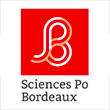Engineering and digital sciences
The department brings together skills from the fields of computer science, electronics, mathematics and mechanics. These complementary scientific disciplines join forces to meet the major challenges of the industry of the future and digital technology.

 Le robot de l'équipe Rhoban (Labri) lors de la Robocup 2019 © Robocup Federation
Le robot de l'équipe Rhoban (Labri) lors de la Robocup 2019 © Robocup Federation
Engineering, or engineering sciences, digital sciences, mathematics and computer science are all fields that combine several scientific disciplines. The common goal of our department is to develop, design, create, foster, use and recycle practical and useful systems in multiple sectors of our society. This chain must be efficient, ethical and respectful of the environment in which it is implemented.
These are the founding principles of the department, which develops research in all fields that allow not only the design and implementation of complex systems but also data acquisition, communication between the different elements and the modeling of phenomena occurring at all operation stages in these complex systems.
Management / leadership
Director: Henri Bertin
Activities
This department is structured around two themes: engineering and digital technology. Although these topics provide a thematic structure, many scientific and research projects are carried out with an interdisciplinary/transdisciplinary focus.
On the engineering side, research topics concern materials, acoustics, human-machine interfaces, control systems and signal processing, civil engineering and design in both mechanics and electronics.
As for digital sciences, research encompasses the foundations of mathematics, computer science, electronics and cognition, the study of complex systems and connected objects, security and reliability, modeling, calculation and simulation, massive and diverse data, artificial intelligence.
Current developments in the fields of both digital sciences and engineering require the mobilization of skills that extend beyond a single disciplinary field. Examples include large-scale systems of smart objects and the factory of the future.
Key figures
- 4 joint research units
- 1,340 staff incl. 640 lecturer-researchers & researchers
Component structures of the department
This department is composed of 5 primary research units.
Primary units
- Bordeaux Institute of Mathematics (IMB - UMR 5251 - CNRS - IPB - Inria)
- Bordeaux Institute of Mechanics and Engineering (I2M - UMR 5295 - CNRS - IPB - Arts et métiers ParisTech - Inra)
- Bordeaux Computer Science Research Laboratory (LaBRI - UMR 5800 - CNRS - IPB - Inria)
- Integration: from Materials to System Laboratory (IMS - UMR 5218 - CNRS - IPB - Bordeaux Sciences Agro - EPHE - Inserm - ST Microelectronics - Total - Thales - PSA)
- Estia Recherche (linked by agreement with the University of Bordeaux)
Governance
Component council
The Component council is composed of 26 members, including 12 lecturer-researchers (or affiliates), 8 support staff, 4 doctoral students and post-doctoral students and 2 external members.
Directors' committee
Marc Arnaudon (IMB), Jean-Christophe Batsale (I2M), Yann Deval (IMS), Jean-Philippe Domenger (LaBRI) and Nadine Couture (Estia Recherche).
Scientific council
This Scientific council is composed of 4 national and international experts (currently being appointed).
Platforms
- Xyloforest - Forest Cultivation - Timber Products & Materials
Doctoral schools
- Doctoral School for Mathematics and Computer Science
- Doctoral School for Physics and Engineering
Contact
Gilbert Bounaud-Devillers
Administrative manager
Building A33
351 Cours de la Libération
33405 Talence Cedex
Research booklet
Discover our multidisciplinary, interdisciplinary and international research!
Keywords
Health, robotics, smart transport, factory of the future, biology, ecology, information processing.



